This was translated by me in ’85-6 mainly with some people close to Os Cangaceiros (who later joined OC) and with a bit of help from one or two already in it.
There’s a lot of mythology surrounding this group, and some of it deliberately promoted by them themselves. But some of the myth also comes from those who merely want to be known for simply associating with them, to pump their own history up with some “by your notorious friends shalll ye be known”.
Undoubtedly they did some excellent exemplary stuff – like this text I’m putting out here, supporting the prisoners in revolt in France in ’85, forcibly stopping trains and distributing this text in the trains in order to get maximum publicity for this solidarity action. Or their theft of architects’ plans for prisons. They also provided rebels, mainly those in the French squatting scene, with some good ideas on how to expropriate the expropriators – ie how to rip off banks through “fraud” – and provided a network that enabled such activity. Given the depressing lack of such projects nowadays, and the sense of demoralisation permeating much of the working class, the desire to mythologise the past, only looking at what was radical and experimental in it, often takes precedent over a more balanced and critical point of view. But in assessing some aspects of this past, a critique of mistakes or contradictions is not in any way intended to assert some superior detachment, or to the absurd distortion that I pretend to be above making mistakes, but to contribute to trying to make sure that such contradictions are superseded, not hidden by an inordinate respect. Credit where credit is due: respect what is worthy of respect, but critique what is not. And even though OC has long ago been shrouded by the mists of legend, there are and will undoubtedly be, in the near future, increasing amounts of experimental forms of collective activity that could learn something from the mistakes of the past.
*******
The translation reproduced here has been reproduced in lots of other places – here, for example. But this was one directly involving OC themselves (there are some errors,due to my inadequate French at the time). This version refers to the “requirements affirmed by the prisoners: remission for all condemned prisoners; the liberation of all remand prisoners; a definitive stop to all deportation orders; the lifting of all punishment for all the mutineers.” In fact, whilst translating this, there were long attempts to work out a better translation of “exigences” than “demands”, because the word “demands” sounded too leftist. So in the end, the word “requirements” was settled on. But you don’t eradicate an element of semi-leftist substitutionism merely by mistranslating a word (any more than changing the name of Windscale to Sellafield altered the nature of that monstrosity). In fact, these demands had been put into the mouths of prisoners when they themselves hadn’t expressed things like this. The one ex-prisoner with whom they kept up contact for several years as a result of meeting him in connection with the riots and with this text, was very dismissive of these demands and said that the rioting prisoners never had such demands and were a littlle contemptuous of that side of the text. Whilst these 4 “demands” were something they would have liked to have happened in the absence of the abolition of prisons, they were realistic enough to know that they could never be accepted and so such demands were never put. Anyway, affirming demands on the part of people who never claim them for themselves smacks of politics and of leftism.
What was exemplary in the support for the prison riots of ’85 was the combination of practical sabotage, a subversive text and a movement to which both related. It is this general positive “lesson” that is worth applying as part of a more general social movement – not specifically prisoners alone. However, to produce a text and an action which could contribute to subverting more general contradictions necessarily involves subverting the marginality imposed on us rather than pumping it up as something positive the way OS almost invariably did – particularly in their valorisation of crime, the narrow ideology of “Never Work” and the tendency to fetishise violence in itself (which led them to uncritically support football hooligans as a continuation of the violence of the miners after the defeat of the strike of ’84-’85). The ideology of “Never work” inevitably tended towards a hierarchical contempt for the dispossessed who worked, who lived by, more or less, legitimate means (though almost everybody nowadays has some fiddle going). I could write endless amounts of stuff about this attitude but I’ll try to stick to the most general and essential critique, which is that this attitude and the attitude of “being a revolutionary” generally, tends to hide from consciousness the contradictions one has in common with the rest of the proletariat and valorise those things that make one special, tends to repress awareness of what makes one “ordinary” in order to merely focus on what makes one “extraordinary”. To a certain extent, this could be said of those who identify with their work also: of course everyone needs to find some pride in their means of survival, but this shouldn’t obscure the fact that it is external authority – the economy – that imposes the necessity of work, legal or illegal, and the separations that go with work or crime.
*****
OC were ridiculously into self-publicising to the point where they claimed to initiate stuff that they themselves hadn’t at all initiated – in particular, the massive squat in the rue de l’Est in the early ’80s, openly declaring in one of their journals that they (as “Fossoyeurs du vieux monde” – “gravediggers of the old world”, the group that half of the members of OC had belonged to) had started this anti-police and anti-political mass squat when in fact they came after the squats had been opened and some socially critical stuff had already begun. Which really pissed off those in the know: such a claim to leadership when they hadn’t lead it is really the kind of thing one would expect of Leninists. They also have claimed that – as a group – they initiated the solidarity with the prisoners’ scandal (ie forcing trains to stop – without endangering any passengers – and distributing this “Freedom is the crime…” text). Certainly this was initiated by one or two members of the group, and the text was written by them, and then the rest of the group and at least 5 others not in the group joined in. Fine. Almost all subversive risk develops like this: a couple of friends think it would be a good idea to organise a strike, occupy a building, attack a police station or whatever, talk about it with other friends or the relevant people and it snowballs (or doesn’t). Sometimes people put a temporary group name on an activity, but this is hardly vital (and it often makes those people who are not yet partcipating feel that they can’t, because this is an organisation that has already been set up and so you often feel you can’t influence it, whereas without a name, there’s a greater sense of fluidity; or there are those who want to join the group so as to have some of its notoriety wash off on them, but never initiate anything, having a very servile relation to those already in the group who have developed the group theory, feeling they can’t add to or criticise any aspect of this theory, or initiate practical activity that might be a bit different from the kind of activity the group has got used to doing). But when it’s as illegal and as explcitly threatening to the State as this activity was, it was not very strategic to put a name on the activity. It made the State’s task easier. Moreover, it wasn’t an activity exclusive to those in the group. Pointing this out might seem to be pedantic, but it shows a certain “inner” v. “outer” hierarchy. That is, those in the group who contributed as much as those outside the group were – merely by being part of the group, presented to the outside world as those who organised the action, whereas those who were also part of the action but not in the group were photoshopped out of the picture. So why put a group name on it? The text was sufficient support, but to put a name on the activity was to possess it and to develop a spectacular notoriety that backfired on them: they were constantly pursued by the state, some were imprisoned, others fled the country.
They also often had a very alienating gang-type mentality; for instance, when one of them – out of some whimsical momentary paranoia – suddenly accused a guy living in the squat of being an undercover cop, all the others immediately joined in, violently threatening to do him in, until someone they trusted eventually turned up and managed just in time to vouch for him and they were forced to calm down. Worse, several of them went round to someone at 6 o’clock in the morning and slapped him believing that he knew that his wife had threatened to grass them up for something, when in fact, he was in dispute with his wife (they separated shortly after) and hadn’t known about her intentions (which she never carried out). And another example: someone who had been excluded from their group wrote a critique of them in very general non-specific terms (mainly about their collectivist mentality), distributing it to just a few people but not publishing it. When some of them bumped into him during the train-drivers strike of ’86-’87, he was threatened by them, one of them (Leopold Roc) almost hitting him, yelling at him – “Enough criticism! – don’t you dare criticise us!” He felt sure that if he hadn’t been there with some of his mates they would almost certainly have beaten him up ( perhaps this is why they were so uncritically admiring of football hooligans).
Another – certainly one of, if not the, most respected member of OC, at least amongst the members I knew – came to our place with the ex-prisoner they’d met as a result of the “Freedom is the crime…” action and proudly told us this story of how the evening before him and this ex-prisoner guy’d been walking round Brixton, heard some music they liked coming from inside a squat and started talking with the squatters, who then invited them in and they got chatting but he didn’t like their yuppy cadre type conversation, so instead of having a big row and storming out went down to the kitchen in the basement and gathered some newspapers and set fire to them, and then left. We were jaw-dropped shocked. And the ex-con was also kind of embarassed by the mad bravado of this guy, boasting his psychotic behaviour as if to prove how truly delinquent and extreme he was in his critique…they were squatting, had invited them in and he wants to burn them out!!!… This guy now sucks up to academics in his quest to valorise Marseille culture, worse than the kind of person he would have burnt out 25 years ago.
***
In “The blurred trail of the Cangaceiros in the social pampas” Leopold Roc (LR) wrote after OC disbanded: “Especially because I’m writing now to English-speaking readers, I know that these comments will be easily taken by some people as a confirmation of their old individualist stance, which a priori dismisses any kind of collective attempt as a “breeding ground of hierarchical power”, the “alienation of the individual by the group” and so forth. I still think that this kind of criticism is irrelevant. True enough, as soon as people join forces for some long-term purpose, there are risks that power conflicts erupt, that specialized roles coagulate, or that emotional feelings are kept hidden behind a veil of ‘objectivity’ – and Os Cangaceiros was not exempt from this at all. But this is no reason to sit back and wait till ‘the revolution’ magically solves those problems: they exist anyway, and are as such part of the experiment enabled by a collective activity, from which you can learn valuable lessons. The real question rather, is how to reach and maintain a sufficient level of fluidity between the group and its social environment; failing this, the group tends to follow a separate logic, and to become its own end – a sort of autism, which in turn exacerbates ‘inter-personal’ conflicts.”
There are several things here that are avoided – in many ways it’s strangely and conveniently over-simplified. Firstly, LR never gave me this text. This is no narcisistic egocentric indignation: at that time I was the only English-speaking person who had helped to translate and publish some of the OC texts, especially, but not exclusively, this text here (“Freedom is the crime…”). Moreover, over half of the group had stayed at my place in London at one time or another (and I have stayed at the place of 2 of them, but only after they’d been kicked out of the group). LR himself had often stayed at my place, and I at one time had helped get him a squat in London. When this was written I had not fallen out with any former OC people. And I even met LR twice after he’d written this critique and he hadn’t even mentioned it to me (I only found out about it over a year after it had come out). And yet this paragraph was clearly addressed to me – maybe to others in England also, but, I suspect especially to me – in particular his critique of a supposed “individualist stance”, a critique made behind my back. He sets up a straw man parody of the “individualism” supposedly adopted by the English in order to knock it down, in order to dismiss as “irrelevant” a vital critical point. This point is the critique of the Collectivity rather than an individualist opposition to collective experimental activity, the critique of organising the organisation as opposed to organising struggle, organising specific activities. Yet LR knew perfectly well that I am not against organised activity and had participated, for instance, in the occupation and actions around UCH hospital in London. And he’d read and translated some of my old “Rebel violence v. Hierarchicial violence” text, which states my position clearly (in, significantly, a critique of Leninist politicians). Now he could have correctly critiqued me in a more subtle nuanced manner – for being dogmatic about setting up organisations – but no, he had to distort my point of view (and not just mine) as a way also of distorting the history of OC.
One significant distortion in his text is in putting the OC tag onto activities which included non-OC members, some of whom sometimes contributed more than many of the OC members. As far as I know the only thing that was exclusively OC was the stealing and distribution of the prison plans (the “13,000 belles…” dossier). Other stuff, including their journal, involved also people not in OC.
The task of subverting a life on the horrific margins of existence is not at all necessarily developed by being a member of some defined collective name, which often DOES become a “breeding ground of hierarchical power” and “the alienation of the individual by the group” (LR, above), which is certainly not to assert the isolated individual as an alternative to such a situation. The need to constantly walk a balance between individual initiative and affirmation and collective experimentation can only be considered “irrelevant” (LR) if one conveniently wishes to see politics as something simplisticly “out there”, not something within our social relations. And when LR says “people join forces for some long-term purpose” this is more complex than the way he puts it. For one thing, even if one has the idea of a long-term purpose (an anti-hierarchical revolution) the connnection with this future has to firstly be seen in terms of some specific short-term purpose if one doesn’t want to end up like some of the more obvious dogmatic political groups whose “long-term” overides all immediate original activity other than a journal and meetings aimed at giving members a sense of doing something.
LR’s history ignores certain precise contradictions under the perfectly accurate statement that “there are risks that power conflicts erupt, that specialized roles coagulate, or that emotional feelings are kept hidden behind a veil of ‘objectivity’”. But then,in dismissing my doubts about the group mentality, he ends up ignoring basic facts. For instance, people often got excluded for reasons of “security” (ie they were lax about security vis a vis the State). But this was hypocritically applied. Those lowest in the hierarchy – ie those with the least, or virtually no, initiative – were excluded for security lapses, whilst the security lapses of those at the top (often just as bad) never even led to the remotest serious questioning whatsoever. It’s better to be paranoid than sorry, sure – but it’s better to keep your paranoia under control and apply it clearly and rationally and indiscriminately across the board to those who endanger your project if it’s not to end up as some self-serving cliquish attitude that belittles those on the periphery and justifies this in the name of security.
Likewise, a political mentality often took precedence over simple questions of human affection. Someone with cancer was treated with utter contempt by the group merely because this person had sought conventional medical help (see “N’Dréa: One Woman’s Fight to Die Her Own Way”, by a member of OC, for a very interesting account of the refusal of conventional medicine, which, nevertheless tended to encourage a dogmatic attitude on the part of the rest of the OC members). In 1987 when 3 members were broken with, including a woman who was having a love affair with LR who remained in the group, LR completely broke off his relation with this woman without explanation to her other than the group explanation (she opposed a man being excluded for reasons of “security”). She felt, understandably, badly hurt by this. Clearly he felt that it was an either/or situation – and he chose the gang. From day one of the group break he didn’t speak or communicate with her for 6 months. Now I don’t say this to be petty, but to give it as an example of how people make false choices and how such choices can be humiliating. Clearly responsibility towards the group was seen as of a higher priority than responsiblity towards any mere individual. Another guy excluded from OC was really upset because he’d thought of LR as his best friend and yet he broke off all contact with him from the day of his exclusion, never to resume it. This really smacks of the alienation of the old leftist organisations. Obviously everyone excludes individuals from their lives. It’s when this becomes a gang attitude that such exclusions become demoralising and hierarchical. And the demoralising effect of people who call themselves revolutionaries is certainly a factor in the demoralisation of revolt and revolution. The essence of alienation is that people create something (a commodity, a Trade Union, a Party or whatever) that then becomes bigger than their will and turns against them: this is equally true of the groupuscule.
There was also a break over political incorrectness – over the leaflet “Quick”, reproduced in the “France Goes off the rails” text here, a leaflet that exaggerated the extent of the ’86 student movement’s attack on this society. 3 people were excluded partly for defending this leaflet. The leaflet was semi-leftist and had been produced by some members of the group based in Paris without the knowledge of others; when they found out after returning from their travels, they took an excessively anti-student line (basicly taken from “The poverty of student life” of almost 20 years before) and LR, who’d participated in the “Quick” leaflet, suddenly changed camps and felt the need to display a group loyalty by breaking off contact with me and the Wises who were producing the “France goes off the rails” text with him. Although contact was renewed about 6 months later the whole thing smacked of “correct lineism” and the need to parade group loyalty. To be sure, LR was, half a year later, belatedly apologetic, without however getting to the root of this policy swing: it had basically been a power battle against the producers of “Quick” who had to be torn down a peg or two for ruining OC’s extremist image. Hence the reactive undialectical line-shift, which now had to claim that the whole of the movement of ’86 was reformist and therefore utter nonsense. Such is politics and insofar as this political attitude isn’t clearly critiqued it continues; it really doesn’t go without saying that nothing goes without saying.
LR in fact (almost immediately after producing his “…blurred trail..” text) went on to participate in the “happy unemployed” organisation in another european country, which was really just a reactive attitude to the dominant image of unemployment, but which ignored the misery. And then went further, organising a pro-Zapatista meeting which included out and out social democrats who showed their sick mentality by openly declaring, “We are entering the epoch of neo-liberalism, which will mean mass unemployment and a vast cutting down of the Welfare State and untold misery for millions. But we should see this as a great opportunity for us, an opportunity to influence and organise these people.” In fact, many ex-OC people or people close to them, went on to this kind of opportunist lowest common denominator politics.
I could go into other aspects of the political mentality, but this is an old story and there’s sufficient here to recognise the pitfalls of such activities. And, besides, what has happened to these people? Some are and remain undoubtedly proletarianised, and may, in their day to day activities if not in their public written texts, contribute to the subversion of these ever darkening times; whereas others have risen within this bleak society, including LR himself, who is now a theatre producer (and another, who’s risen further, and become a high-up in the political organisation of culture for some French regional authority). But, of course, we don’t judge people’s past solely on their present unnecessary compromises, any more than we can automatically despise people in the present based on what might be a dubious past. Nevertheless, there are sometimes links between the past and the present, developments that might seem to contradict their past, but whose germ can be discerned in this past. Which is another way of saying how imperative it is to subvert in the present one’s own unnecessary compromises and repressions as well as others if one doesn’t want to contribute to intensified alienation, another way of saying how essential it is to make clear breaks with the mistakes of the past, in particular the political mentality or the gang mentality, which are in many ways inseparable.
********
Finally, I repeat this, in order to emphasise it:
What was exemplary in the support for the prison riots of ’85 was the combination of practical sabotage, a subversive text and a movement to which both related. It is this general positive “lesson” that is worth applying as part of a more general social movement – not specifically prisoners alone – now and in the future.
SamFanto, March 22nd 2013
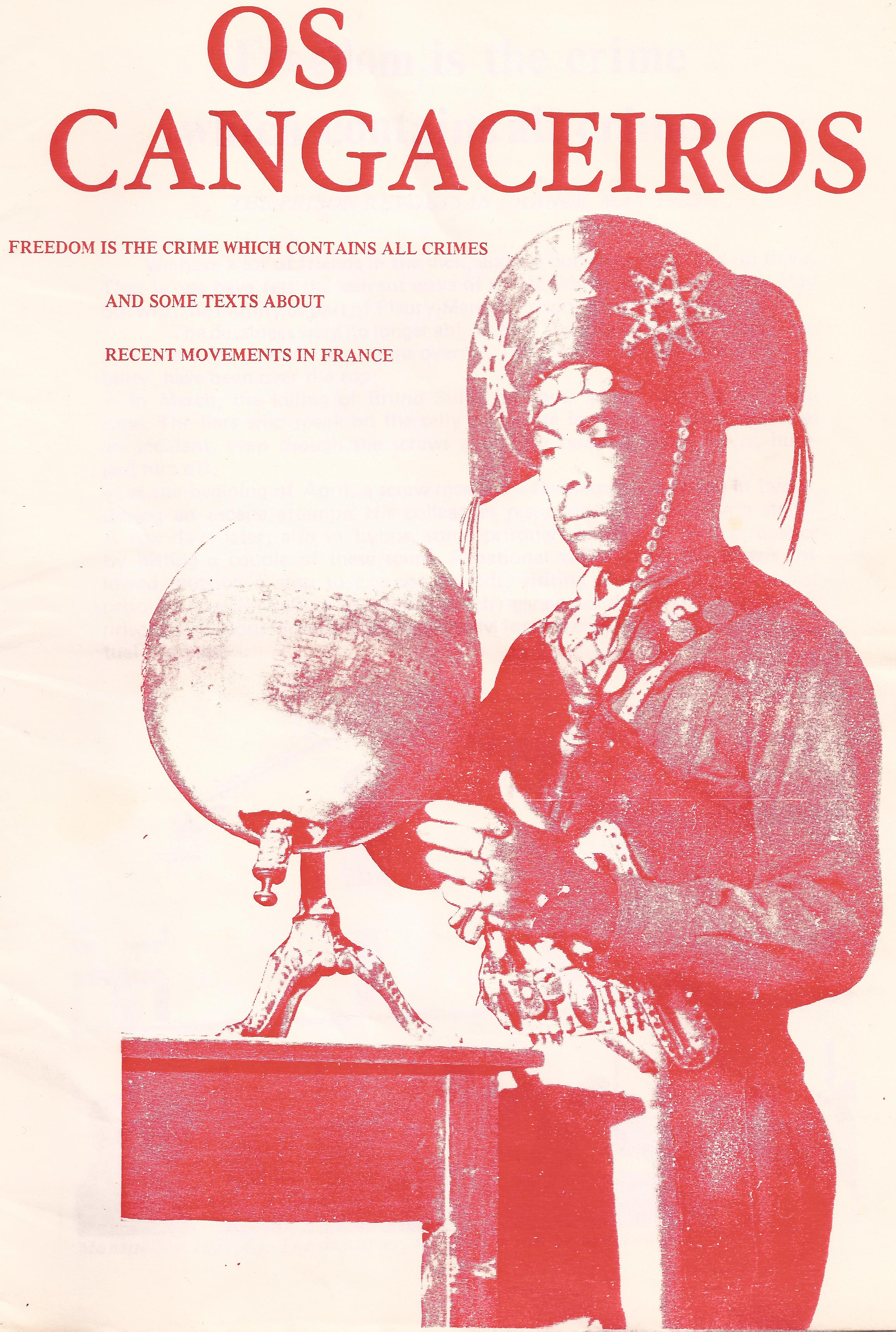
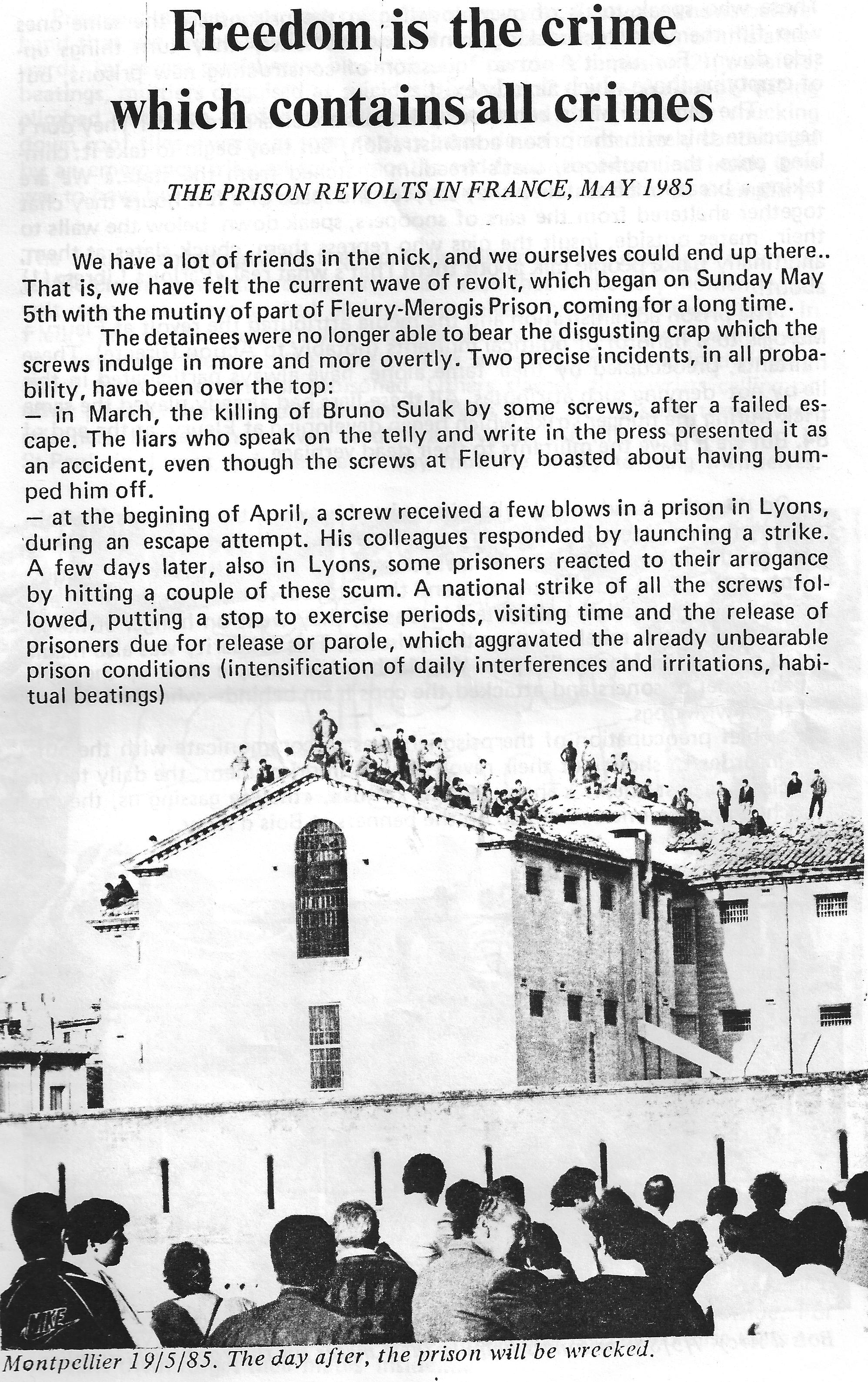
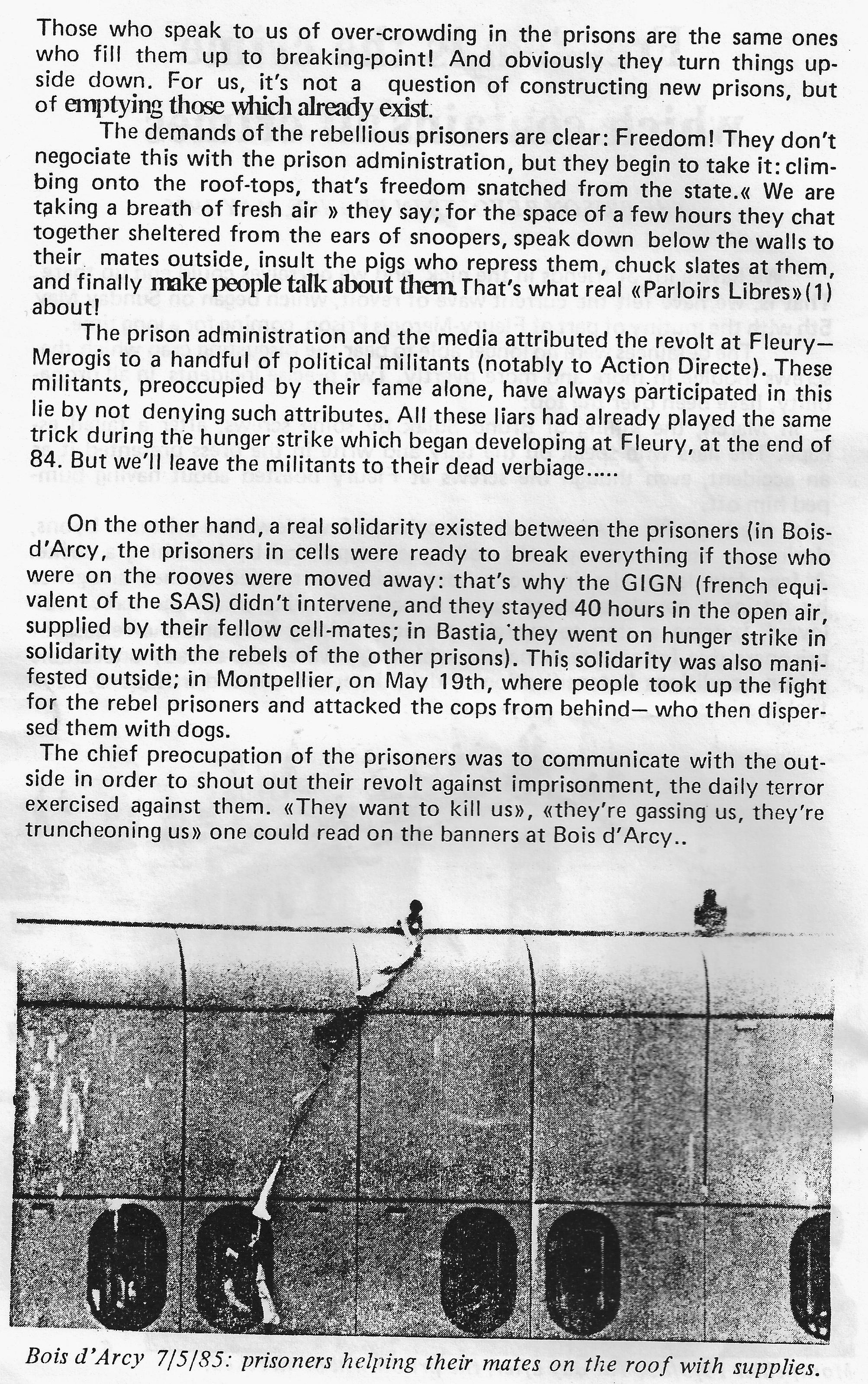
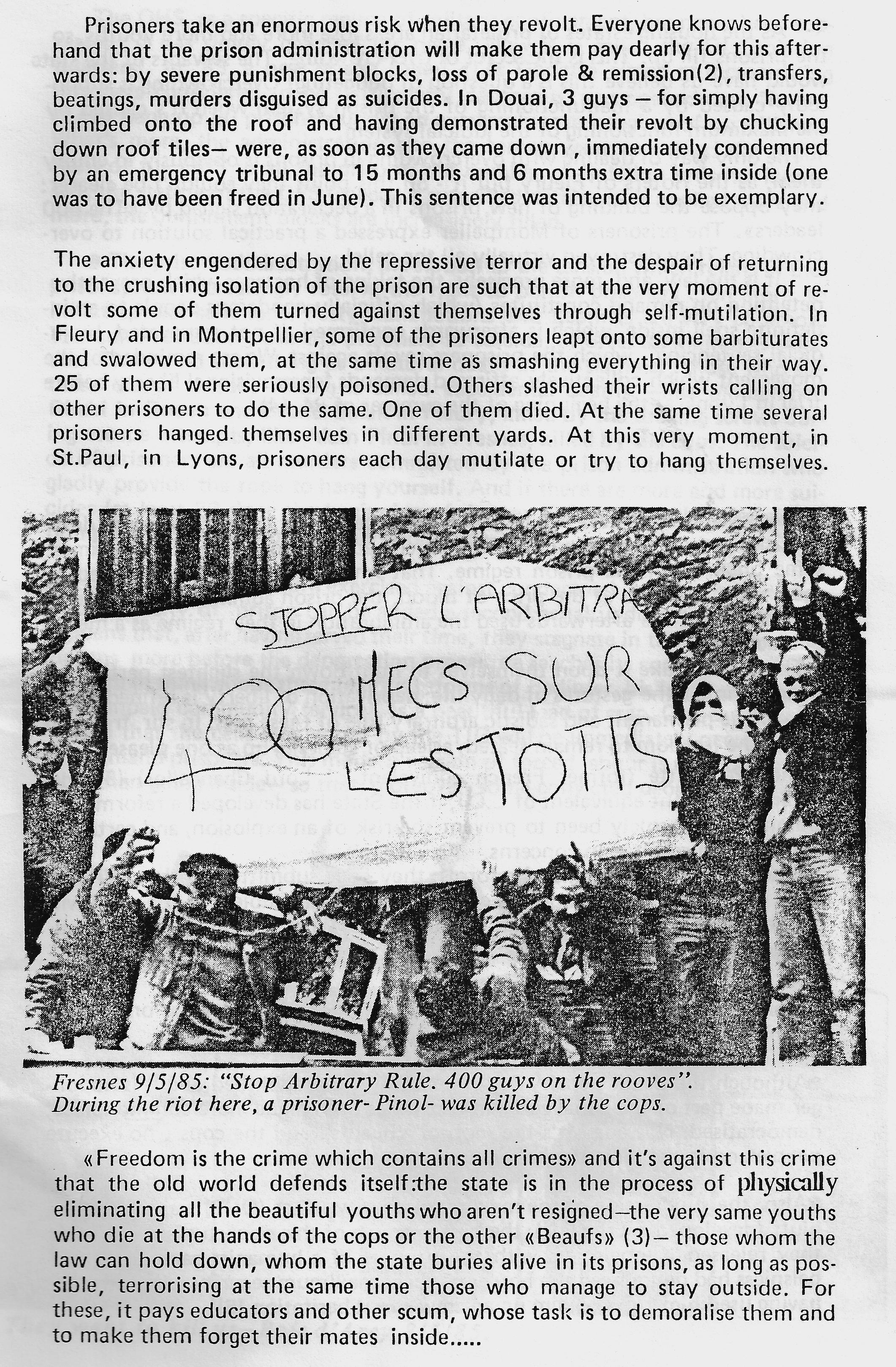

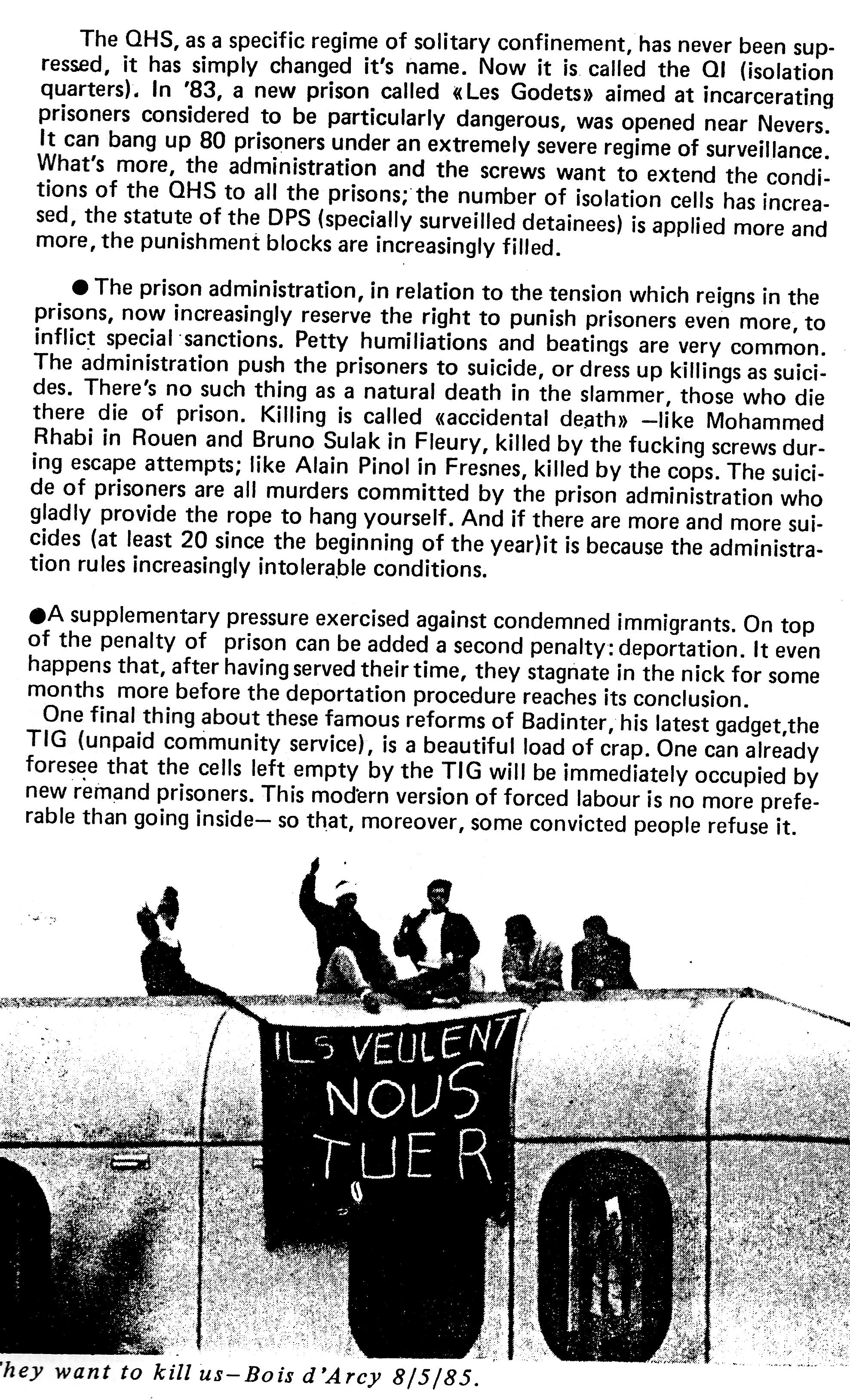
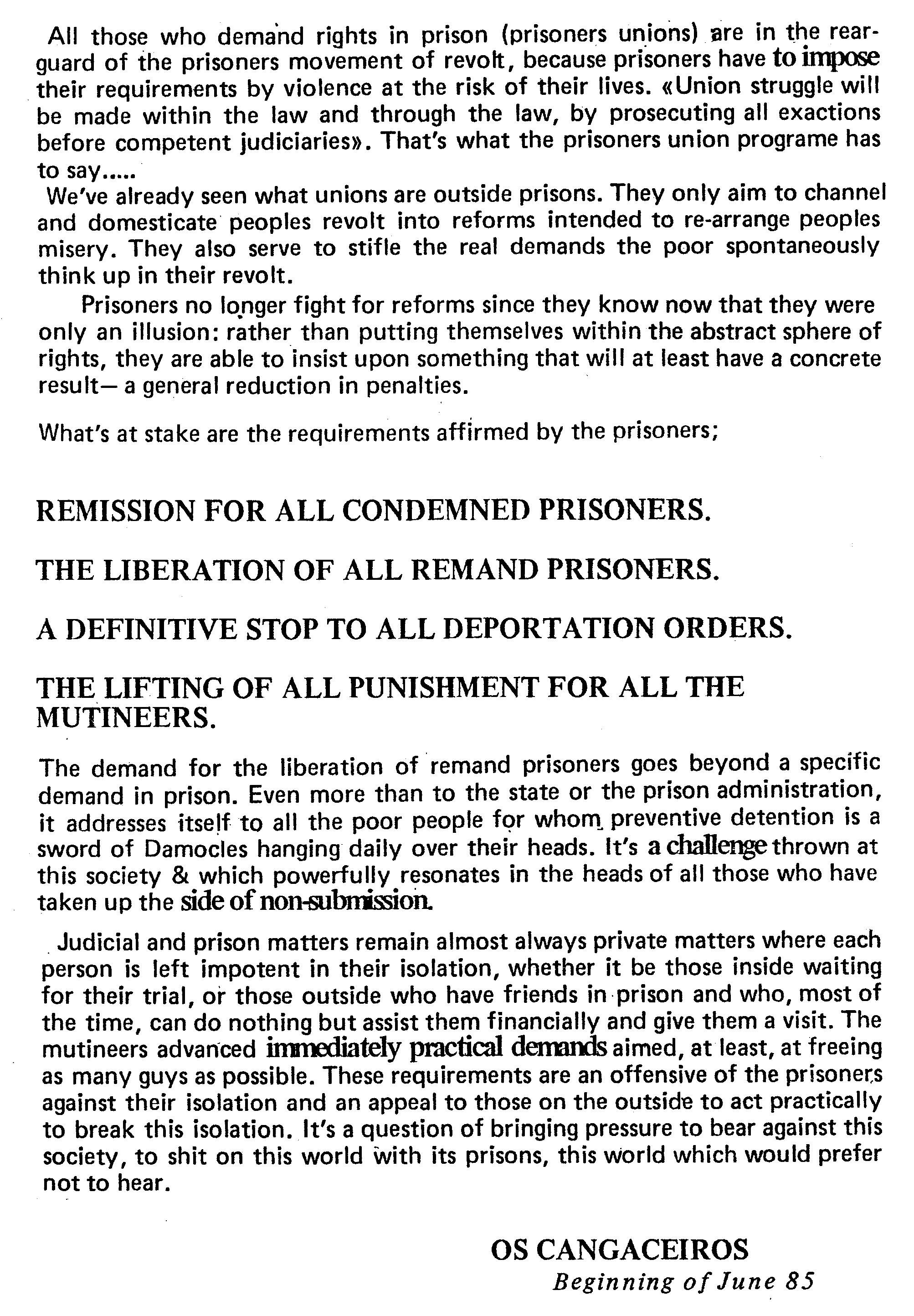
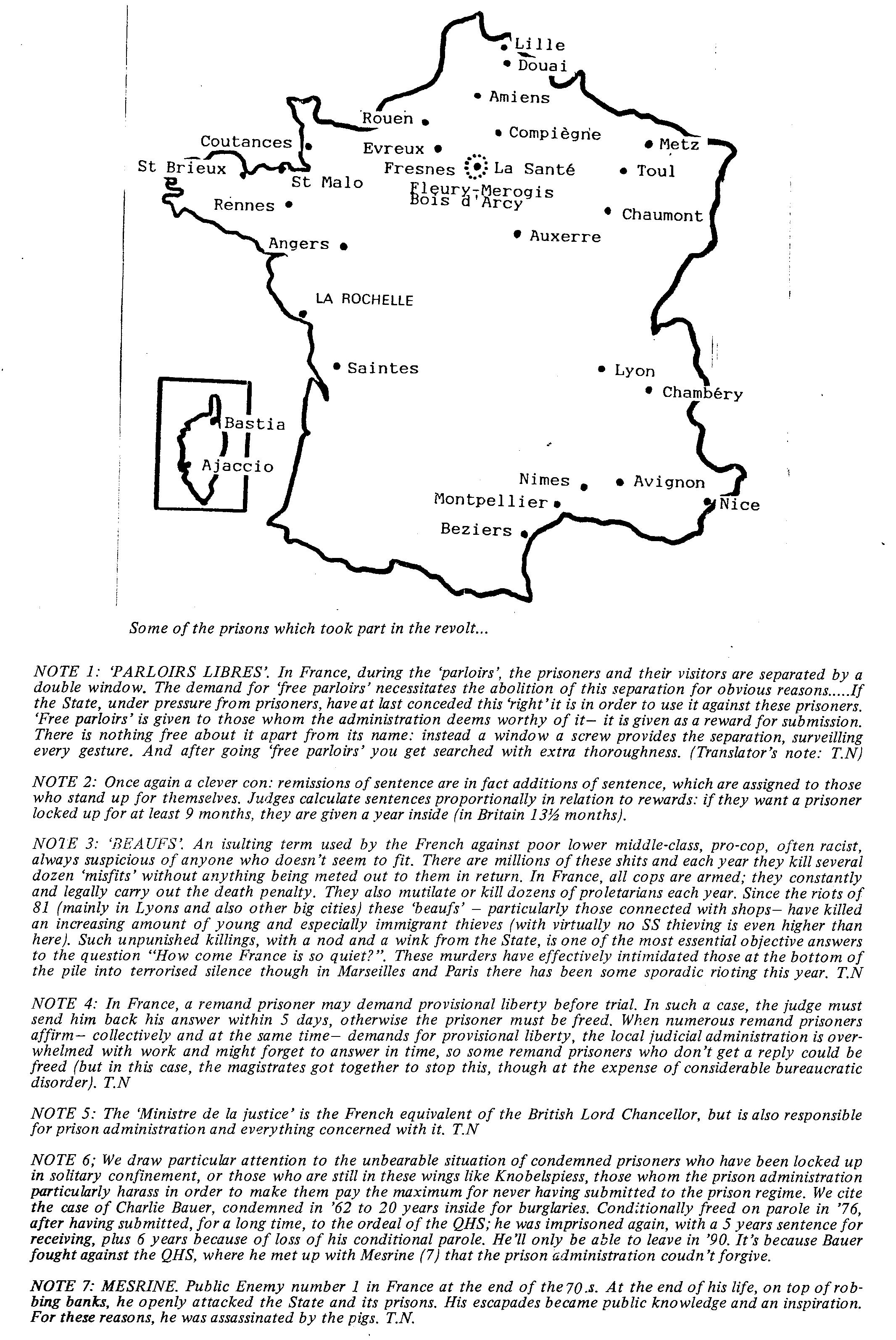
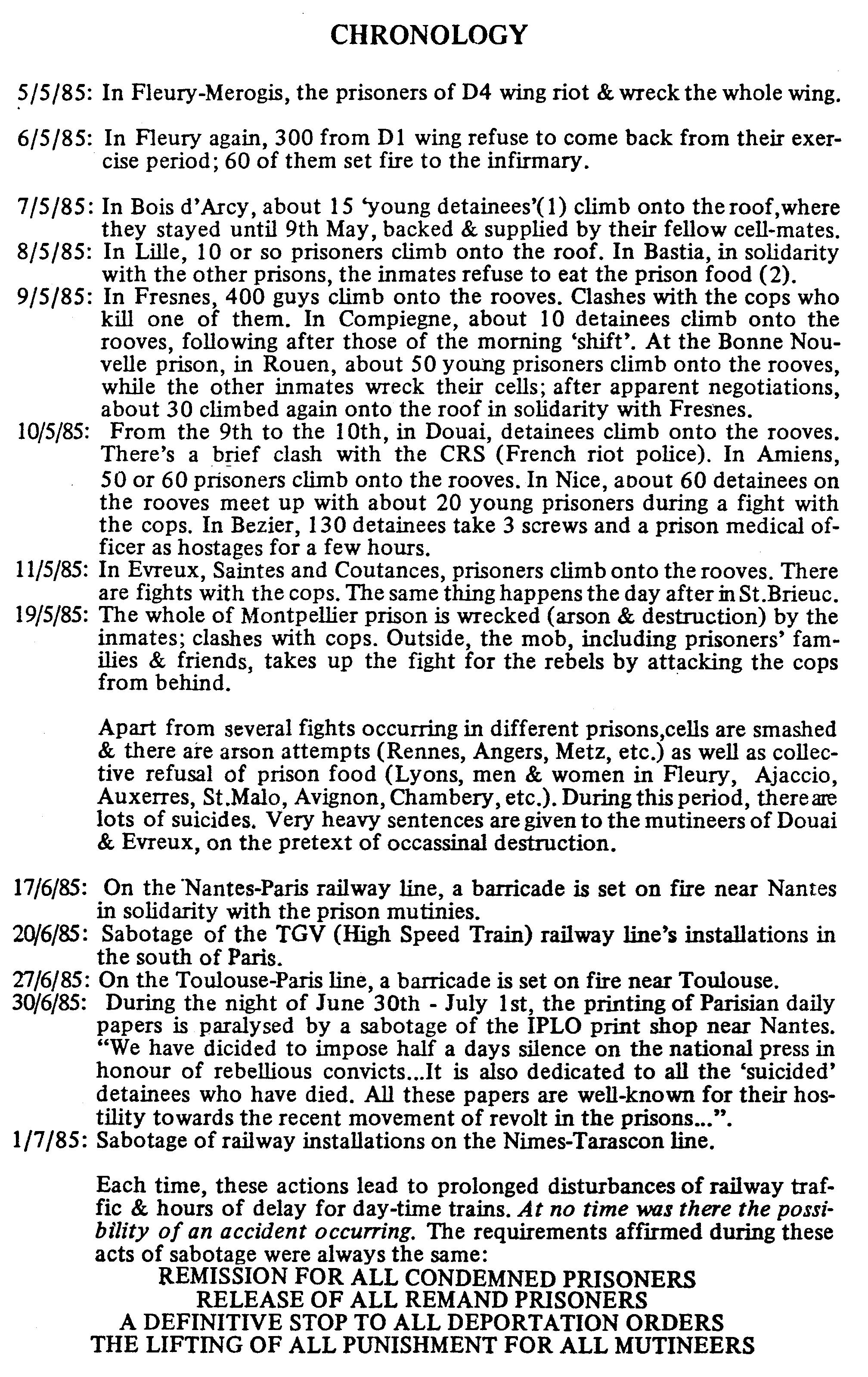
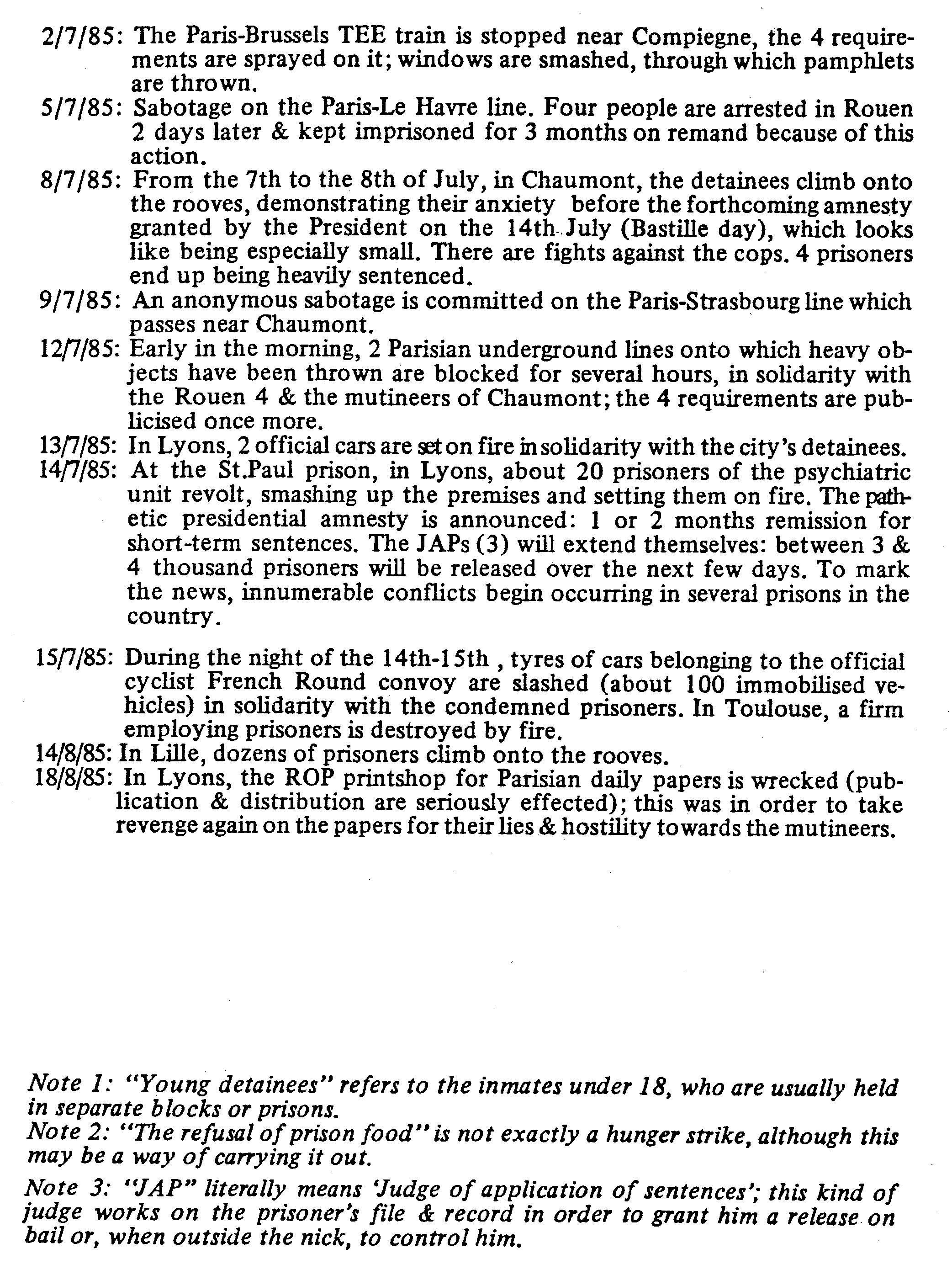
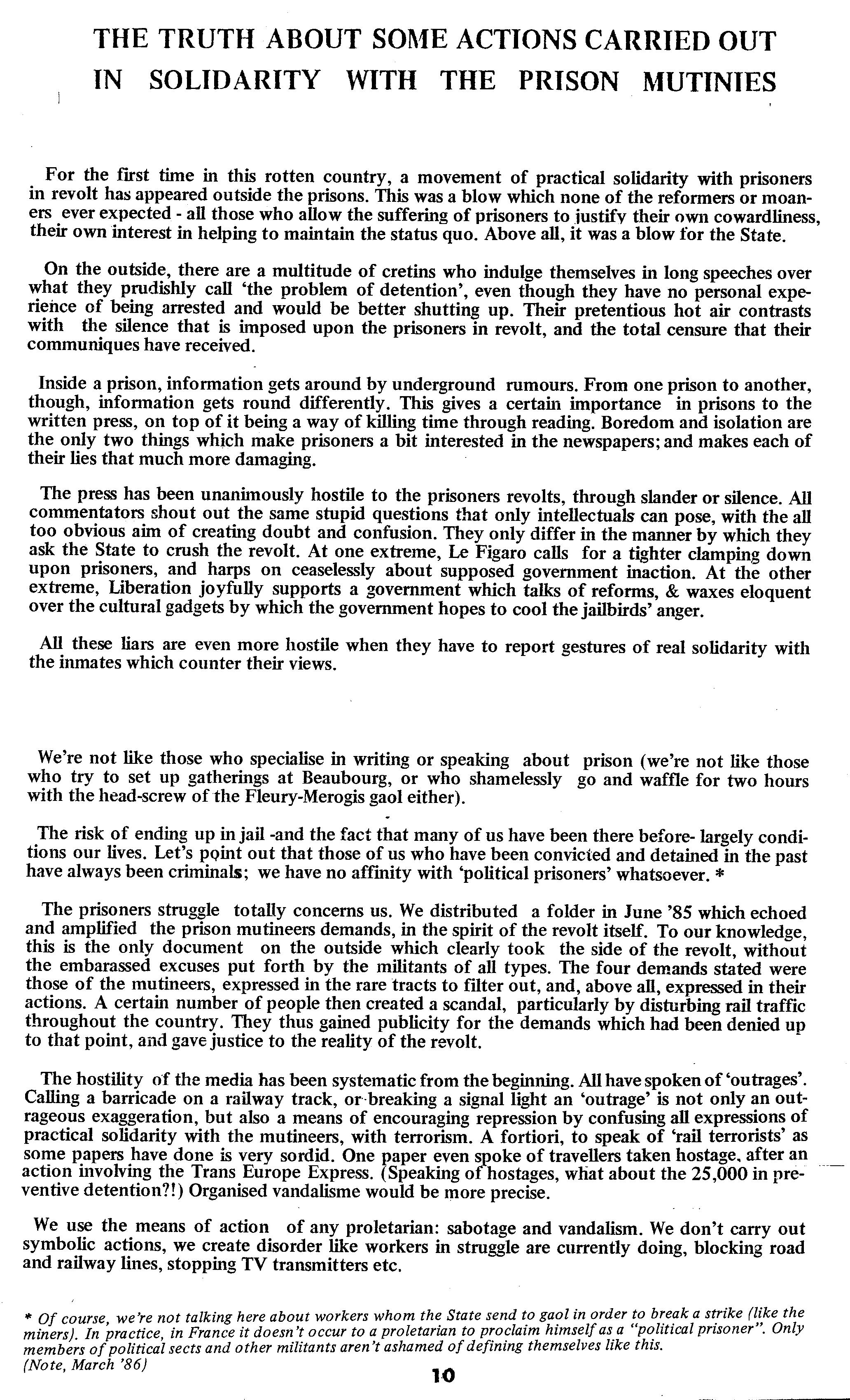
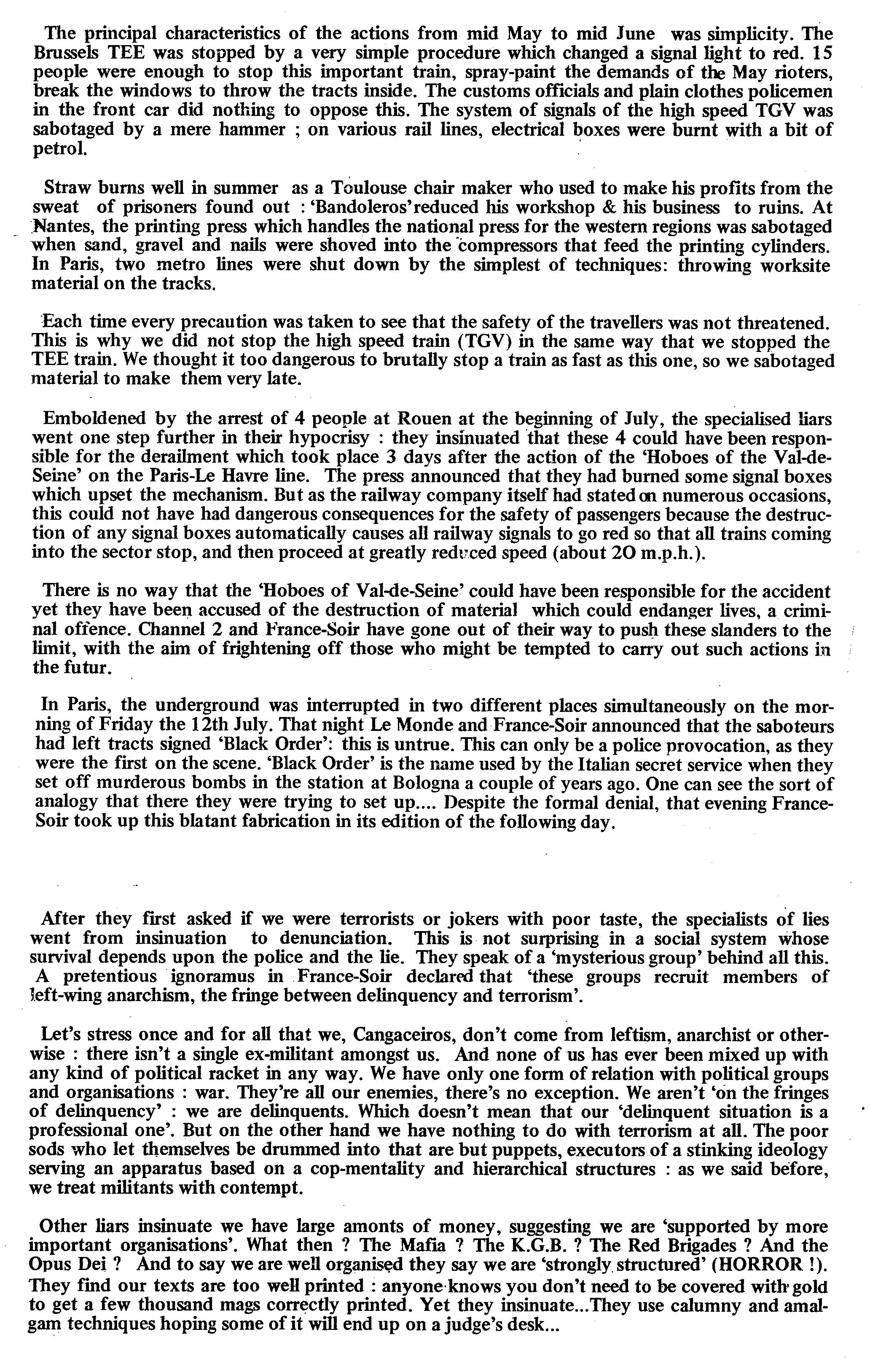
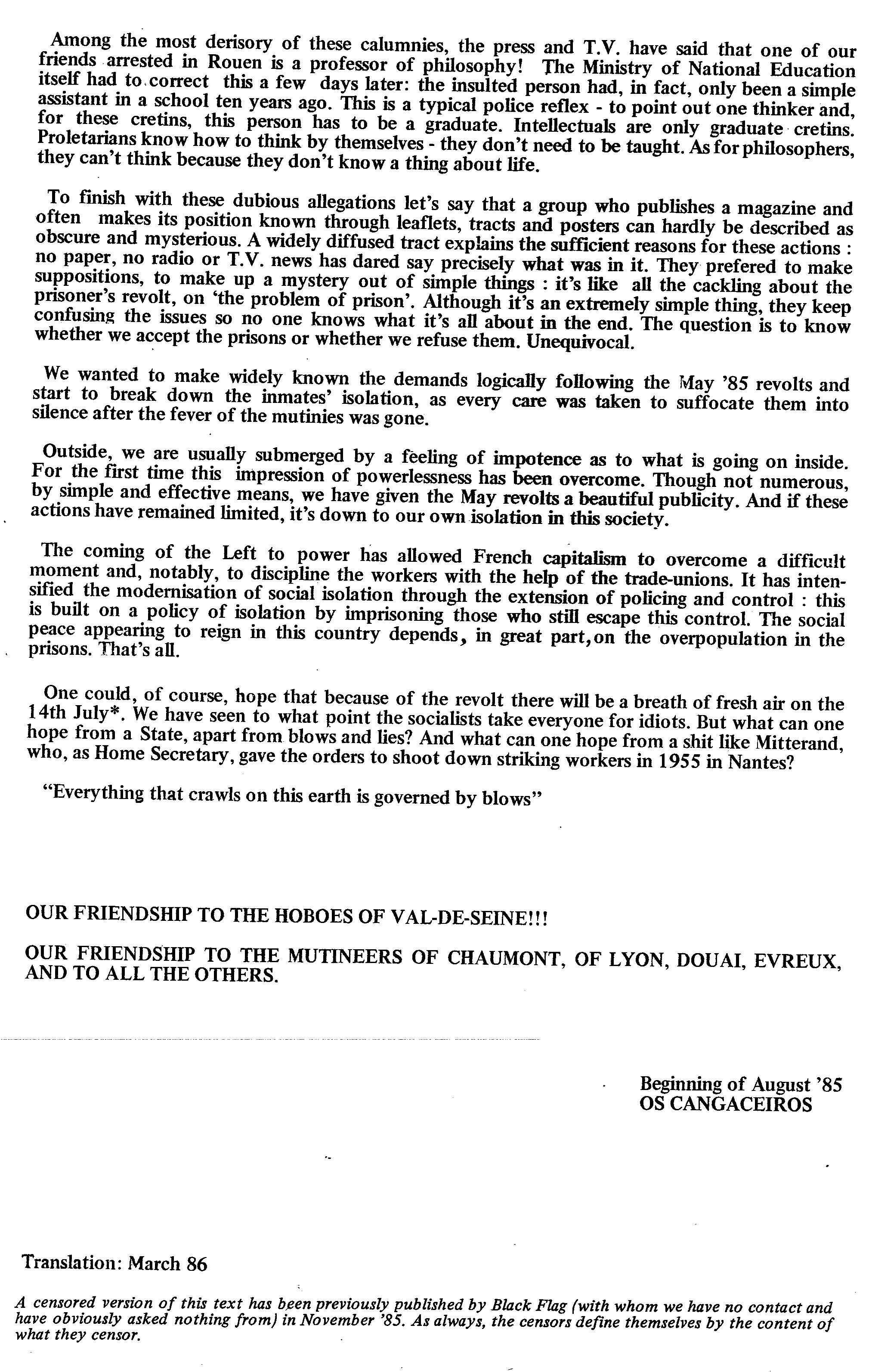
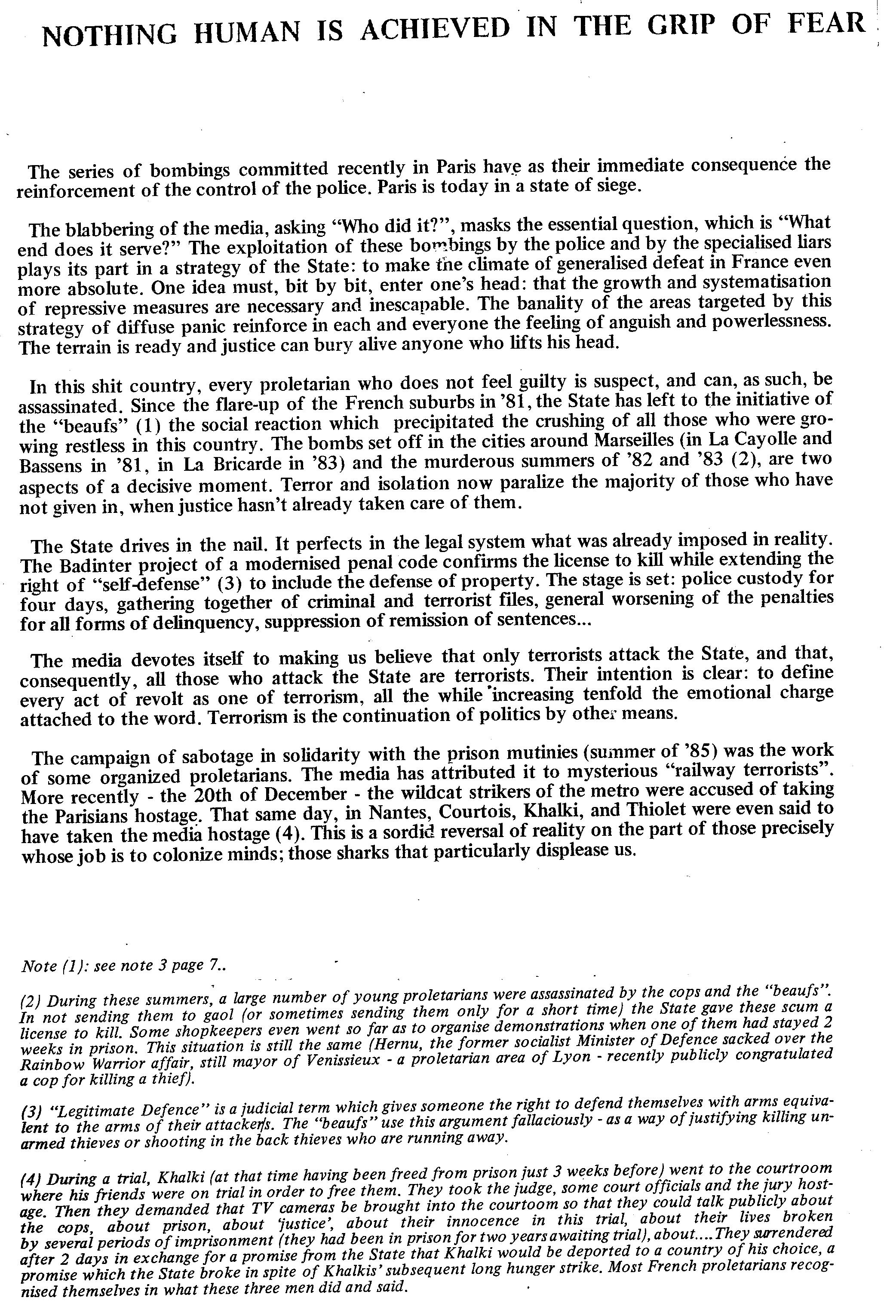
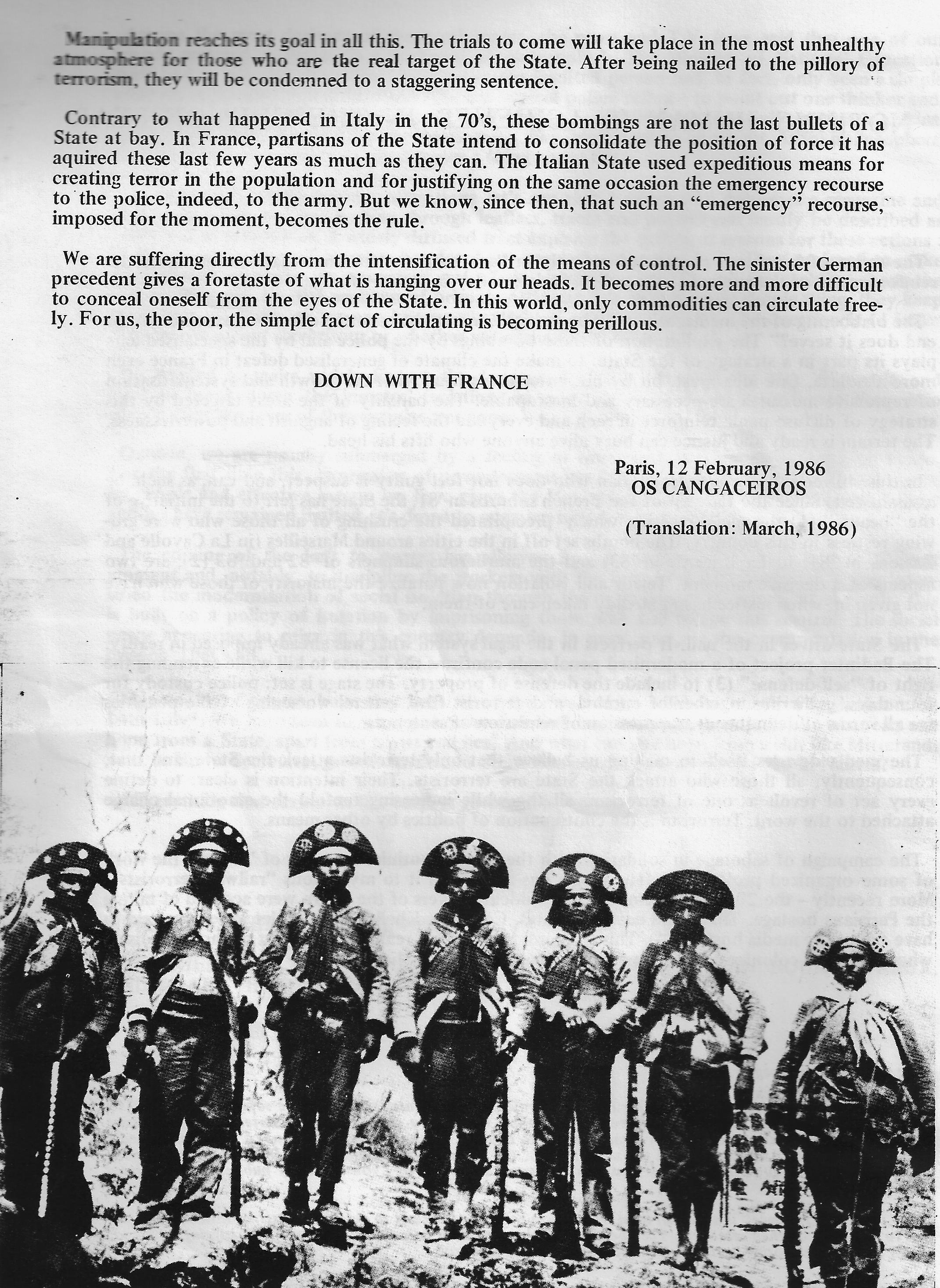
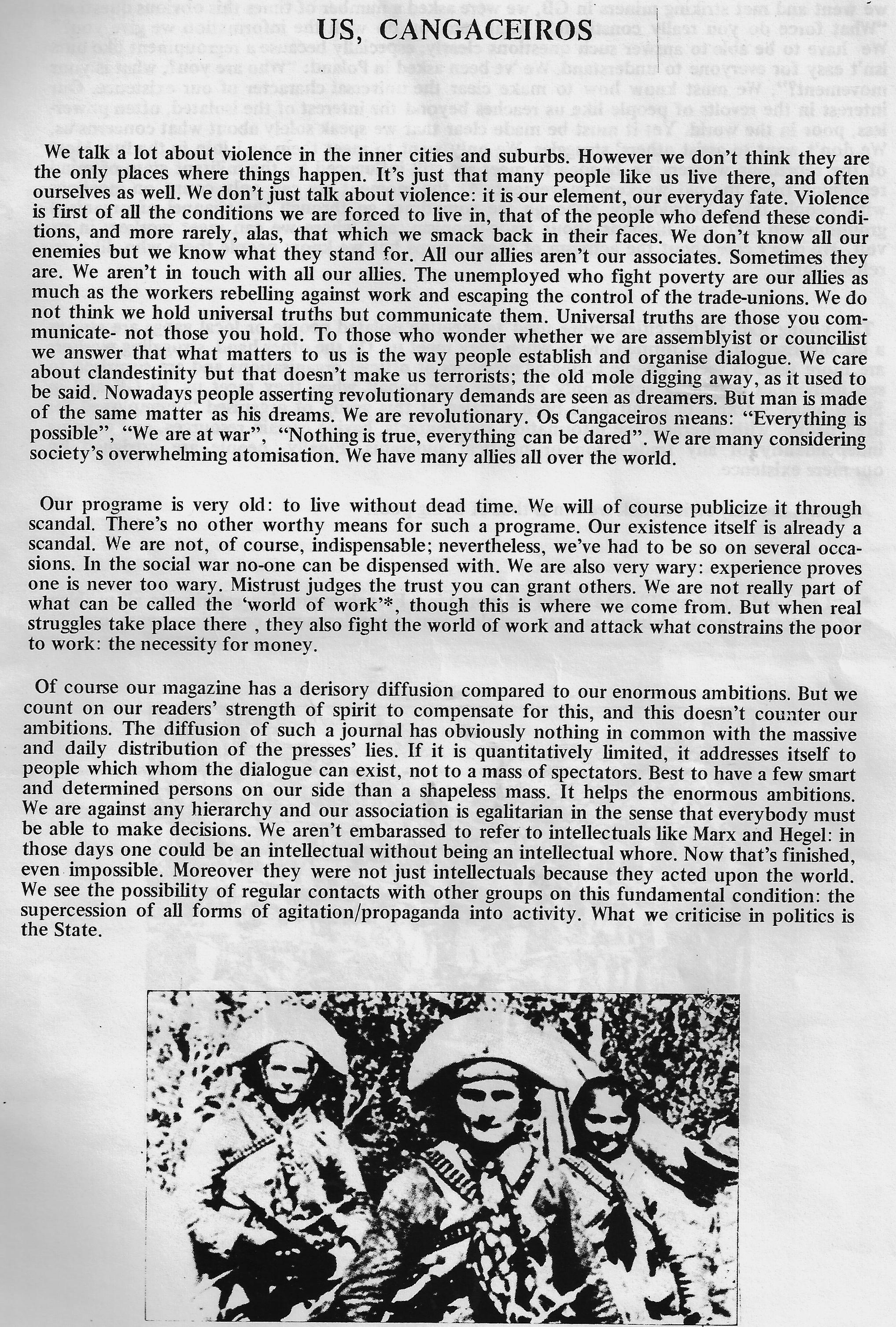
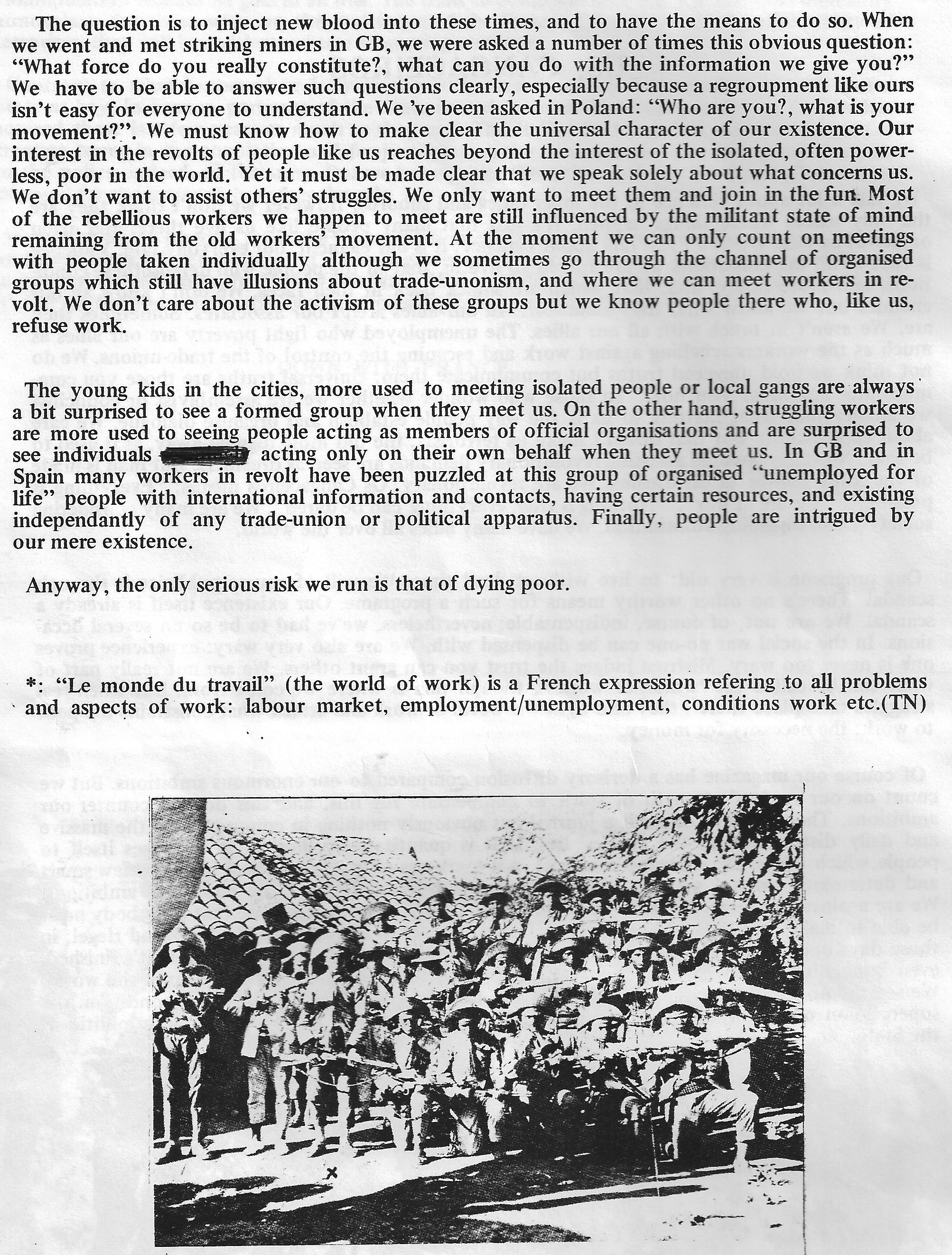
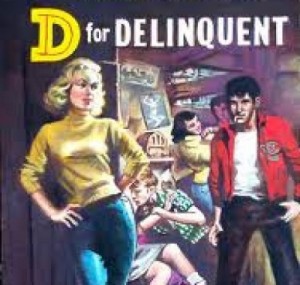
Leave a Reply